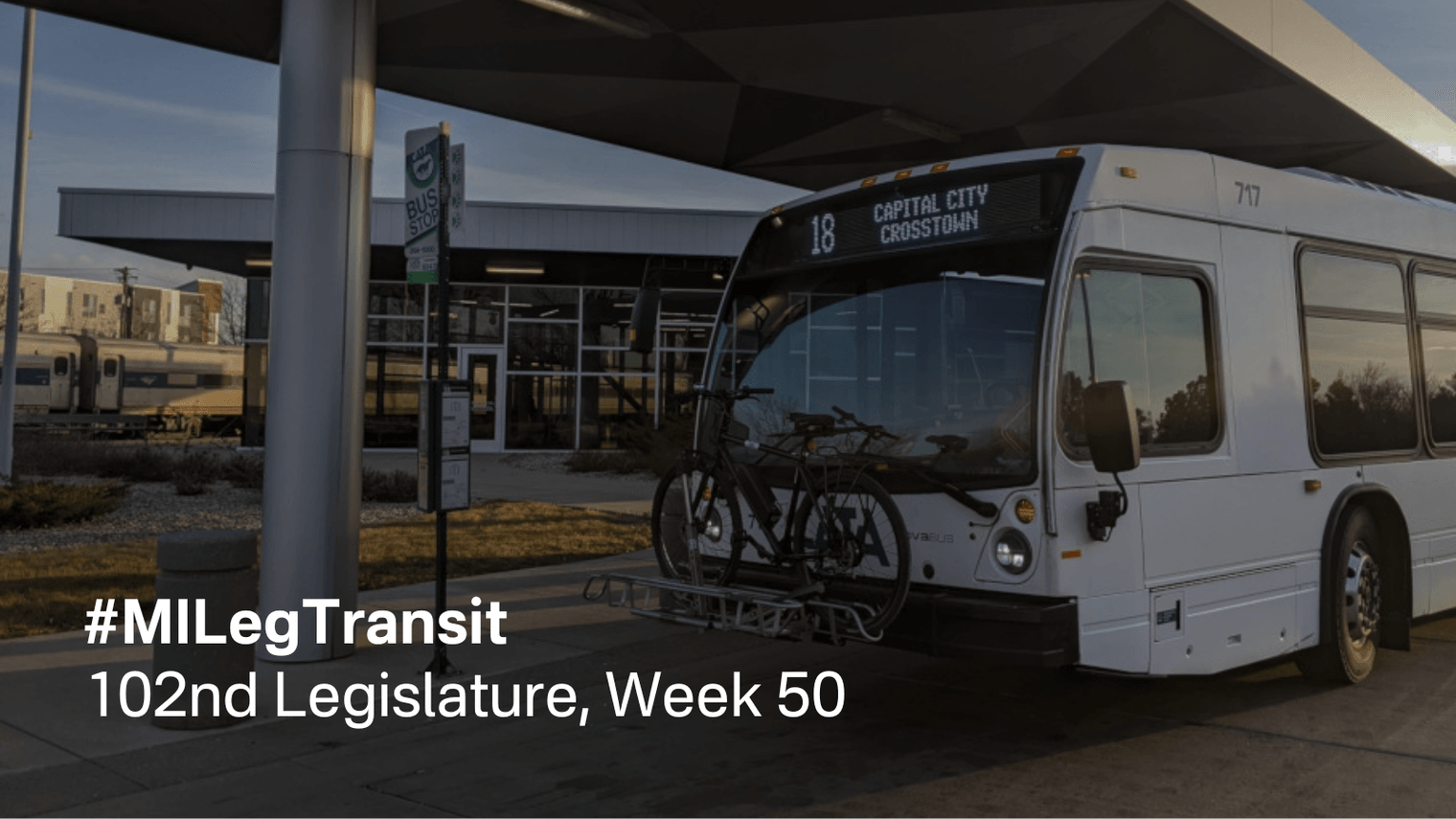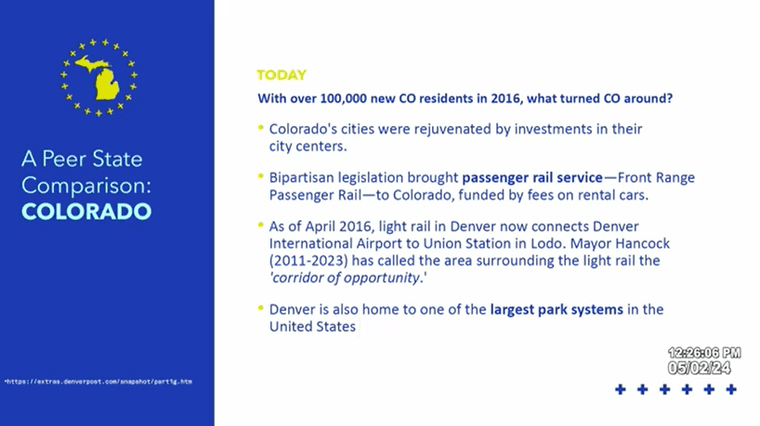102nd Legislature, Week 50: Proposed Budgets Reported from Appropriations

Growing Michigan Together Council Presentation, Part 2
On May 2nd, Hilary Doe, Michigan’s Chief Growth Officer, continued a presentation from February 15th on the Growing Michigan Together Council recommendations.

In Part 2 of the presentation, Doe shared a number of comparisons between Michigan and peer states. A prominent example was Colorado, which invested in passenger rail expansion funded by rental car fees.
Budget Proposals Pass Full Appropriations Committees
The Senate and House budget proposals passed the full Appropriations committees this week and are on track for floor votes next week. The contents of the proposals have not changed, though multiple attempts were made by Republican members of the House to cut a portion of the Local Bus Operating increase, the e-bike incentive , and other mobility initiatives with intent to redirect those funds to road maintenance.
May 1, 2024 • 4:33 pmI believe we need to maintain our local roads, in addition to public transportation, but not instead of. These are funds that support transit agencies throughout the State of Michigan, urban and rural communities alike.
To all the members of the House who introduced these amendments: Look, I get it. Our roads are crumbling, the bonds are expiring, we have a deficit to fill. But stop pointing to every single budget line-item that gives Michiganders alternatives to driving as the problem. Our over-reliance on cars IS the problem. We cannot afford our roads because they’re overbuilt and MDOT is stuck in a regressive mindset of endless expansion and reconstruction as the only solution.
A word from me and fellow transit advocates
This marks the 50th week of the 102nd Legislature (by my count of every week with at least one scheduled session day, regardless of whether members were in attendance). It’s a milestone, but the difficult question remains: What do we have to show for it in terms of improved public transit?
We fought hard to get a major LBO increase in 2023. We’re fighting hard to at least maintain that increase this year and prevent a disaster. But at a point, in conversations amongst ourselves, we’ve become painfully aware that we seem to be stuck in a loop. These are all the same conversations we had last year, with nothing new on the table. Meanwhile, peer states with trifectas like Colorado and Minnesota have successfully brought long-awaited rail expansions online . We’ve yet to even resume studies on fixing intercity transit here , or at least that’s the appearance as far as the public can tell.
I want to be clear: I know there are legislators who have been championing transit this entire time. We see you and appreciate that you’ve kept up the fight. These comments are toward the legislative body as a whole which, after a year, has yet to take adequate steps to address car dependency in Michigan.
May 3, 2024 • 2:26 amSo my wish for the transit caucus moving forwards:
ACTUALLY INVEST in transit
Things like drone delivery, hydrogen cars, and wireless charging, will only ever be gimmicks.
Little things are big. $5M for new rail studies or for expanding MDOT rail would have been great
9/10
Words from Cedar, a fellow advocate living in Lansing, on the House transportation budget proposal
We’ve likely lost any chance of seeing action on regional transit in Southeast Michigan this year. Our next opportunity will be 2026, but even that will be in jeopardy if we don’t begin implementing the necessary changes to state policy now.
In 2022, at the end of the 101st Legislature, there was effectively no action after the budget passed in June. The House and Senate did not reconvene for months due to campaign efforts. This was during Republican control of both chambers, but it’s entirely possible we’ll see a similar scenario play out during campaign season this year with the entire House, which includes many first-term Democratic members, up for re-election. The next two months may be our last chance to see any action on transit before the general election, and we don’t know if the historic levels of federal funding available to transit will be maintained moving forward.
Michigan legislators: It’s time to take concrete action. Not just talking about transit on podcasts and Capitol press corps shows, not just discussing its merits in committee meetings: Action. Let’s get some bills introduced. We have the Transit Caucus now, which is a brilliant step forward; our expectation is that we’ll begin seeing recommendations from that body sooner rather than later.
We can do this. Let’s pick up the pace.
 Jason Morgan
Jason Morgan  Cedar
Cedar